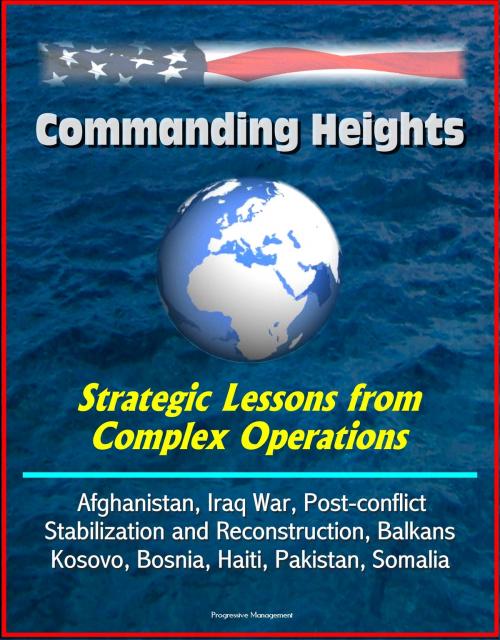Commanding Heights: Strategic Lessons from Complex Operations - Afghanistan, Iraq War, Post-conflict Stabilization and Reconstruction, Balkans, Kosovo, Bosnia, Haiti, Pakistan, Somalia
Nonfiction, History, Military, United States| Author: | Progressive Management | ISBN: | 9781310974434 |
| Publisher: | Progressive Management | Publication: | February 4, 2016 |
| Imprint: | Smashwords Edition | Language: | English |
| Author: | Progressive Management |
| ISBN: | 9781310974434 |
| Publisher: | Progressive Management |
| Publication: | February 4, 2016 |
| Imprint: | Smashwords Edition |
| Language: | English |
Professionally converted for accurate flowing-text e-book format reproduction, this report examines the history and issues involved with complex military and political operations. As acknowledged throughout the essays in this volume, the best approach to complex operations is a genuine whole of government approach. Joint analysis, planning, and implementation are appropriate, not just on the eve of a complex operation, but on a routine and habitual basis—in the pre-conflict phase as well as once conflict has begun. Yet, many barriers to effective joint collaborative analysis, planning, and implementation remain. As 9/11 recedes in memory and Iraq and Afghanistan become part of our quotidian experience in the foreign policy world, there is a risk of reverting to old habits of stove-piping and agency parochialism. Will the whole of government approach that has become so popular in response to the Iraq and Afghanistan experiences be limited to those experiences? Will the benefits of civilian-military collaboration be disregarded as agencies seek to return to more "normal" practices? Already it is possible to detect a note of impatience to do so, or of whole of government fatigue. If the insights of these essays are to be trusted failure to firmly institutionalize a whole of government philosophy and associated practices would be a lamentable mistake, and would constitute an unforgiveable failure to learn the lessons of our experience.
Introduction * By Michael Miklaucic * Essay 1 * Command in Afghanistan 2003-2005: Three Key Lessons Learned * Essay 2 * Understanding the Situation * Essay 3 * Reflections on Post-Conflict Politics of Reform: A Voice from Inside Iraq * Essay 4 * Preemptive Post-Conflict Stabilization and Reconstruction * Essay 5 * Lessons Learned in the Fog of Peace * Essay 6 * Complex Operations in Practice * Essay 7 * No Formulas: Bosnia, Haiti, and Kosovo * Essay 8 * The Balkans Revisited: Kosovo 1999 * Essay 9 * Retaining the Lessons of Nation-Building * Essay 10 * Missions Accomplished and Unaccomplished * Essay 11 * The Politics of Complex Operations * Essay 12 * Reconstructing Post-Conflict Reconstruction: Lessons from Iraq * Essay 13 * Effective Civilian-Military Planning at the Operational Level: The Foundation of Operational Planning * Essay 14 * Lessons Learned in Democratic Transition and Building Civil Society * Essay 15 * Striking the Right Balance * Essay 16 * Understanding and Responding to Fragile and Failed States * Essay 17 * Implementation in a Multiparty Environment * Essay 18 * Beyond the Cold War: Pakistan and Somalia * Essay 19 * Every Complex Operation Needs a BG Rich Ellis * Essay 20 * Post-Conflict Reconstruction Challenges: Some Observations from Iraq
Professionally converted for accurate flowing-text e-book format reproduction, this report examines the history and issues involved with complex military and political operations. As acknowledged throughout the essays in this volume, the best approach to complex operations is a genuine whole of government approach. Joint analysis, planning, and implementation are appropriate, not just on the eve of a complex operation, but on a routine and habitual basis—in the pre-conflict phase as well as once conflict has begun. Yet, many barriers to effective joint collaborative analysis, planning, and implementation remain. As 9/11 recedes in memory and Iraq and Afghanistan become part of our quotidian experience in the foreign policy world, there is a risk of reverting to old habits of stove-piping and agency parochialism. Will the whole of government approach that has become so popular in response to the Iraq and Afghanistan experiences be limited to those experiences? Will the benefits of civilian-military collaboration be disregarded as agencies seek to return to more "normal" practices? Already it is possible to detect a note of impatience to do so, or of whole of government fatigue. If the insights of these essays are to be trusted failure to firmly institutionalize a whole of government philosophy and associated practices would be a lamentable mistake, and would constitute an unforgiveable failure to learn the lessons of our experience.
Introduction * By Michael Miklaucic * Essay 1 * Command in Afghanistan 2003-2005: Three Key Lessons Learned * Essay 2 * Understanding the Situation * Essay 3 * Reflections on Post-Conflict Politics of Reform: A Voice from Inside Iraq * Essay 4 * Preemptive Post-Conflict Stabilization and Reconstruction * Essay 5 * Lessons Learned in the Fog of Peace * Essay 6 * Complex Operations in Practice * Essay 7 * No Formulas: Bosnia, Haiti, and Kosovo * Essay 8 * The Balkans Revisited: Kosovo 1999 * Essay 9 * Retaining the Lessons of Nation-Building * Essay 10 * Missions Accomplished and Unaccomplished * Essay 11 * The Politics of Complex Operations * Essay 12 * Reconstructing Post-Conflict Reconstruction: Lessons from Iraq * Essay 13 * Effective Civilian-Military Planning at the Operational Level: The Foundation of Operational Planning * Essay 14 * Lessons Learned in Democratic Transition and Building Civil Society * Essay 15 * Striking the Right Balance * Essay 16 * Understanding and Responding to Fragile and Failed States * Essay 17 * Implementation in a Multiparty Environment * Essay 18 * Beyond the Cold War: Pakistan and Somalia * Essay 19 * Every Complex Operation Needs a BG Rich Ellis * Essay 20 * Post-Conflict Reconstruction Challenges: Some Observations from Iraq















